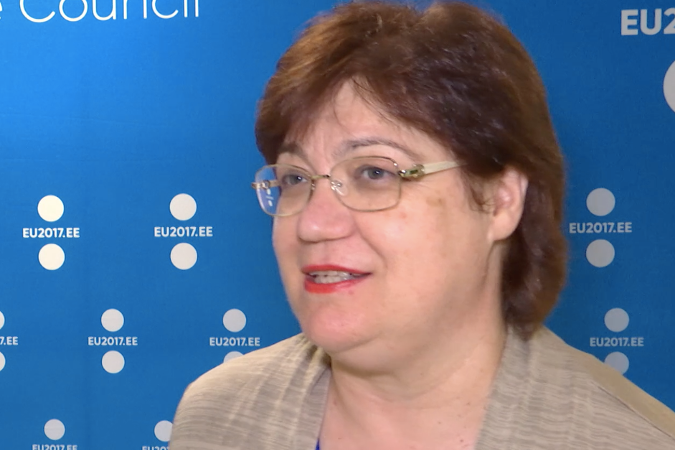Take Five: “Civil society is crucial to monitor the implementation of international commitments on ending violence against women”
Date:

The Center for Legal Civil Initiatives (CLCI) was established in 1997 with the aim of increasing access to justice for Albanian citizens, focusing in particular on women and girls from disadvantaged communities. Recently, CLCI started working with UN Women in Albania to support the establishment of a network of civil society organizations (CSOs) to monitor the implementation of international human rights obligations on ending violence against women – under the regional programme, Implementing Norms, Changing Minds. CLCI’s Executive Director, Prof. Dr. Aurela Anastas, explains their role in the programme and how this network of CSOs can actively support ending violence against women in Albania.
Based on your experience, what do you think should be the main focus for civil society organizations to improve gender equality and end violence against women in Albania?
In Albania, there is a need to change the focus of organizations working on gender equality and ending violence against women. So far, their main concern has been to improve legislation and policies on gender equality. This has proved to be successful. New legislation aligned with the most important international standards are now in place. CSOs are therefore focusing more on the practical implementation of this legislation to address the gaps in the system. CSOs still need to rely heavily on international standards, including those deriving from the international practice of monitoring the implementation of CEDAW,[1] the Istanbul Convention[2] and the recommendations of the respective mechanisms (the CEDAW Committee[3] and GREVIO[4]). While Albanian organizations can use their own tools, it is very important that, in addition to the monitoring of international treaties, CSOs also focus on bringing these recommendations to the attention of the relevant institutions to find adequate solutions. In this regard, I would recommend involving the judiciary and engaging in strategic litigation as an effective way of influencing state policies and practices.
What are the main priorities for the network of civil society organizations that is being established by CLCI under the regional programme?
The main priority for the network is to protect women from all forms of violence and gender-based and intersectional discrimination, using all legal measures provided by the law. This will also involve raising awareness among the Albanian Government and the general public on issues of gender inequality and gender-based violence. In this context, the network will focus particularly on monitoring the obligations related to increasing access to justice and social services for women survivors of violence, including those from disadvantaged groups, as well as ensuring that these women enjoy the same property rights as men. We are aware that to achieve this, it is not enough just to provide legal and psychosocial support to these women. It is equally important to provide information about their rights and raise awareness among Albanian society of the need to change harmful norms and stereotypes that go against international standards on gender equality and non-discrimination.
An objective of this project is to build the capacity of the network’s members to monitor international human rights obligations related to ending violence against women. How do you plan to carry out this work?
We believe it is important that CSOs become more informed about CEDAW, the Universal Periodic Review mechanism and, in particular, the Istanbul Convention and GREVIO’s baseline evaluation report for Albania, published in November 2017. Therefore, CLCI will focus on increasing the knowledge of network members on GREVIO’s specific recommendations for Albania, through the implementation of a number of activities. For example, CLCI prepared a questionnaire that they shared with CSOs in Tirana, Durrës, Vlorë, Shkodër and other districts, to assess their capacity to monitor international human rights obligations related to gender-based violence, and to identify the needs for capacity-building. Based on the results of this questionnaire, CLCI will prepare manuals and organize trainings, which will provide guidelines for monitoring international standards.
What are some of challenges you expect in the implementation of the project and how do you plan to overcome them?
One of the first challenges we may face is that the CSOs that we will work with specialize in different areas. Luckily, this can be easily overcome by organizing the work into different thematic groups.
Why is it important for CSOs in Albania to base their monitoring work on GREVIO’s evaluation report and CEDAW Concluding Observations for Albania?
First, CEDAW and GREVIO are effective mechanisms that monitor the implementation of the most important international treaties in the area of gender equality and ending violence against women. The Constitution of the Republic of Albania provides for the obligation to implement all international agreements ratified by the Albanian Assembly. Second, I believe that GREVIO’s report and CEDAW’s final observations for Albania include progressive findings and recommendations for the most effective methodology for analyzing and assessing the real human rights situation in relation to violence against women in Albania.
[1] UN Convention on the Elimination of all Forms of Discrimination against Women
[2] The Council of Europe Convention on preventing and combating violence against women and domestic violence
[3] Committee in charge of interpreting and monitoring the implementation of the CEDAW Convention by State Parties
[4] Independent expert group monitoring the implementation of the Istanbul Convention